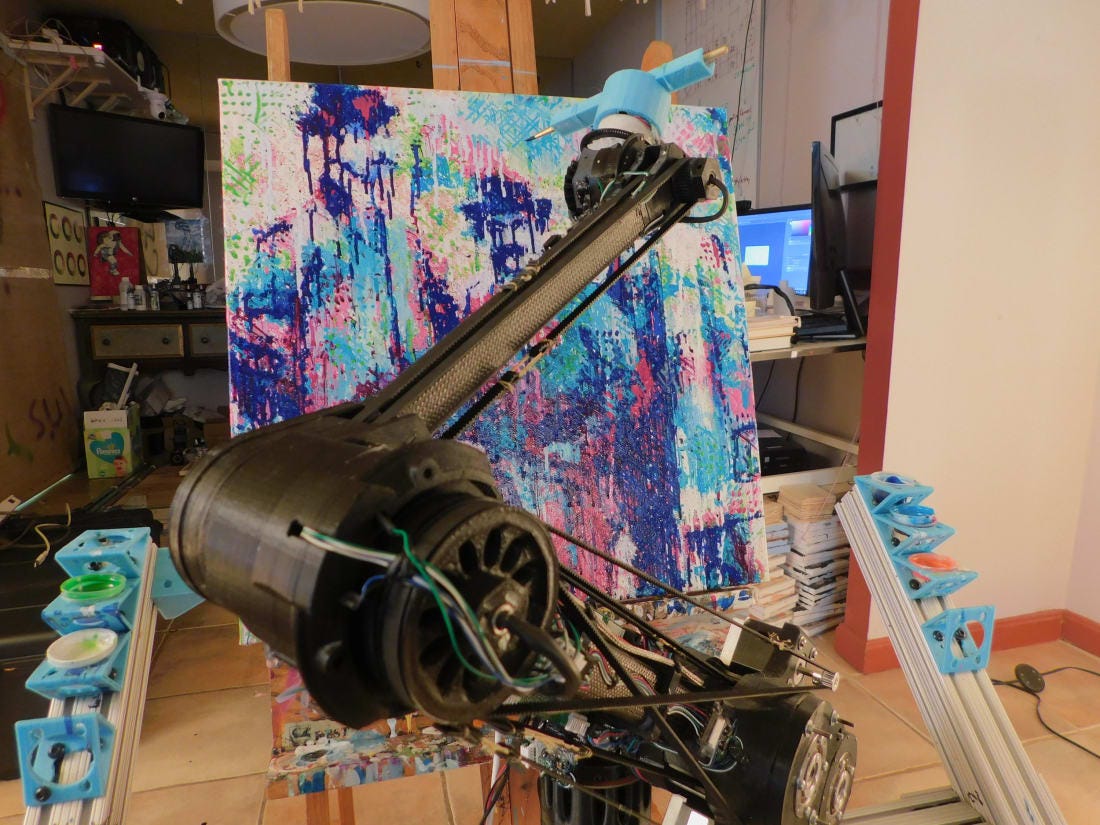The End of Trajectory
A Final Edition
Today marks the end of Trajectory. Thanks for being a subscriber and reading. It has been immensely satisfying to follow my intellectual curiousity and write about a range of different trends shaping our future, but Trajectory has come to the end of its journey.
I’ve turned my attention now to a new newsletter that I launched recently - Emergent, a newsletter about the fastest-growing businesses in emerging markets. If this is something that you find interesting, please sign up! Here are some of my favorite early pieces:
As for Trajectory, you’ll find short summaries and links to all previous editions below. I’ll plan to keep the Trajectory site live forever and keep these pieces available online.
Trajectory #1: B2B Rental Models
A couple months ago I wrote The Rental Economy, an article about a growing wave of consumer startups I have seen that allow consumers to rent an asset or good as opposed to buy it. The article was picked up by Axios in their coverage of the issue as part of a surge of press attention on the subject.
Trajectory #1 detailed a few examples of B2B rental models and analyzed some of the business models underpinning them.
Trajectory #2: Can AI Create?
I’ve been thinking about the limits of what machine learning and AI are capable of for a while and creativity is one thing that may be beyond their reach. While we have AI-created music and art and more, the question remains on whether this is really creativity at all.
Trajectory #2 talks through what makes up creativity and how machine learning systems might simply not fit this definition.
Trajectory #3: The AntiTrust Hammer
Trajectory #3 was my first public writing about antitrust concerns in the technology industry even though it’s a topic that I find deeply important. Today, a growing chorus of outrage worldwide is driving regulators to investigate the tech industry. Regulators and the general public have legitimate antitrust cases against the Big Four tech companies - Apple, Facebook, Google and Amazon.
Trajectory #3 dove into the details of these antitrust concerns and analyzed why they are well grounded claims.
Trajectory #4: Cellular Agriculture
Trajectory #4 was about the challenge of decreasing the carbon intensity of industrial meat production. Globally livestock accounts for a shocking 14.5% of all emissions. These emissions are only going to increase as the world’s population grows and gets richer. The last few months have seen a wave of press attention and public awareness around plant-based, “meatless meats” as a replacement for meat consumption.
Trajectory #4 examined the impact of meat production on the world and explored a little known but potentially better long-term alternative - cellular agriculture, also known as “lab-grown meat.”
Trajectory #5: Surveillance in Public Spaces
Facial recognition technology is the most prevalent and widely known version of public surveillance, but a slew of other methods are under development that serve the same function. Privacy is increasingly disappearing in the internet age. But privacy in public spaces is going to be non-existent in the near future.
Trajectory #5 analyzed the range of surveillance technologies available to governments and analyzed what this means for the world.
Trajectory #6: American Isolationism
Trajectory #6 was about the question of America’s increasing return to isolationism. Public sentiment and the media pin the cause of this on President Trump’s unilateral foreign policy moves and his “America First” doctrine. But this is lazy analysis and doesn’t delve into the true drivers of America’s return to isolationism. Deep US engagement with the rest of the world is a historical anomaly. Isolationism has been the historical norm.
Trajectory #6 briefly outlines how the US emerged from isolationism to become the leader of the world and then analyze the real drivers behind the return of US isolationism.
Trajectory #7: Short-Termism in Capitalism
Politicians and the public lambast public markets and public market investors as being overly short-termist and putting tremendous pressure on companies to maximise short-term returns. Often, maximising short-term returns is said to come at the expense of long-term company sustainability and environmental / public health. But in many ways I believe the idea that public markets are short-termist is a narrative mirage.
Trajectory #7 delves into the history of shareholder value theory and explores alternatives to the public market including the Long-Term Stock Exchange and alternative stock structures.
Trajectory #8: The Access Act of 2019
Trajectory #8 was about a recent bill proposed in the US Congress around creating new standards for data portability and interoperability on social networks like Facebook, Whatsapp and Instagram. The bill is smart regulation and is thoughtful in how it defines large communication platforms, where it places the burden of adhering to regulation and the rights its gives consumers.
Trajectory #8 outlines why this is a good bill but discusses why it doesn’t go far enough and what the next phase of tech regulation needs to look like.
Trajectory #9: The Autoimmunity Crisis
There is a quiet public health crisis brewing globally. Diseases of autoimmunity are soaring globally and 23.5m Americans live with an autoimmune disease. The rise of autoimmune diseases has been theorized as linked to the decreasing diversity of our microbiome thanks to chemical exposure and lifestyle changes.
Trajectory #9 analyzes the autoimmune crisis globally and then explores theorized causes including genetics, chemical exposure and decreasing microbiome diversity.
Trajectory #10: A World Data Organization
The internet is fragmenting into dozens of different internets. The world needs a new global regulator - a “World Data Organization” - to preserve the original dream of a “world wide web.”
Trajectory #10 analyzes how the dream of a free internet is coming apart and how the World Trade Organization and the global trade system is a good example of what a World Data Organization can look like.
Trajectory #11: A Fourth Industrial Revolution
The Future of How We Make Things
The world is in the early days of a fourth industrial revolution. This revolution will connect the global manufacturing sector to the internet, further automate production but most importantly enable us to produce in a way that has never been possible before — mass personalization.
Trajectory #12: Optimizing Complex Systems
The magic of combinatorial optimization
Optimizing the systems that underpin the global economy - factories, powerplants, supply-chains and more - will be critical to combating climate change. Luckily the tools of combinatorial optimization combined with computing power make this possible at scale for the first time.
Trajectory #13: Machine Learning and Archaeology
Silicon Valley Meets Mesopotamia
Machine learning is transforming archaeology. Everything from site discovery and identification, artifact classification and document translation will be disrupted by new machine learning-driven approaches to archaeology. The next few decades will see a significant acceleration in the pace of archaeological discovery.
Trajectory #14: The Covid-19 Pandemic
A Selection of critical stories on the Covid-19 Pandemic of 2020
Published on March 18th just as the world woke up to the impending tsunami of the COVID-19 pandemic, this piece included a selection of articles that captured the zeitgeist of the moment and our understanding of the pandemic at the time.
Remarkably so many of the things that have happened since were already known by the world at the time or underway including Moderna Phase 1 vaccine trial, thoughts on an impending collapse in public markets and the norm-breaking actions of the US government to try stave of economic disaster.
Trajectory #15: The Small Business Nightmare
A tidal wave of small business bankruptcies
A total economic lockdown is a nightmare scenario for small businesses that many will not survive. Every additional week of lockdown pushes millions more Americans into unemployment and thousands of small businesses closer to bankruptcy. The mass bankruptcy of small businesses will have profound consequences for years to come.
Trajectory #16: Deglobalization
Reshoring, the shortening of supply-chains and a a new globalization
Reshoring, the shortening of supply-chains and a a new globalization
The Covid-19 pandemic has shattered the mystique of global supply-chains and shown their vulnerability. It will accelerate a trend towards moving previously outsourced manufacturing capacity back onshore in the US, Europe and Japan. Globalization will look fundamentally different after 2020.
Trajectory #17: The End of University Inc
Covid-19 Threatens to End University as We Know It
There are 4,000 universities in the United States that generate over $650 billion in revenue and educated 20 million people annually. A perfect storm involving declining revenues and state funding are putting many of these universities at risk of bankruptcy. Many will not survive. Is this the end of University Inc in the United States?
Trajectory #18: The Vaccine Race
Vaccines, antibodies and the race to immunity
A global arms race to identify, test and manufacture an effective vaccine for Covid-19 is bringing the brightest minds in medicine, public health, manufacturing and supply-chain around one goal. From the Brazil to Russia and the United States to China over 179 vaccine candidates are being tested. This week we’ll look at the vaccine candidates that are showing the most promise.
Trajectory #19: The November Standoff
Mail-in Voting and a disputed 2020 US Presidential Election
The 2020 US presidential election will be unprecedented and remembered for the massive surge in mail-in voting and the potential impact it will have on the result. But mail-in votes will be counted slowly in the days following the election. As these votes are counted and the results change in the days after November 3rd, the risk that the result is contested, called fraudulent and even that the election will be branded as stolen by either side represents a constitutional crisis of the highest order. The 2020 US Presidential election may be the most high-stakes election in US History.
Trajectory #20: Global Money Laundering Part I
How dirty money moves across the Global Financial System
It has been an open secret for some time that the global financial system is awash with dirty money. The recent leaks of the FinCEN files illustrates this problem in detail. Despite efforts to strengthen financial security and anti-money laundering safeguards, dirty money flows in the financial system continue to worsen. This two-part series will delve into the problem about money laundering and what can be done about it.
Trajectory #21: Global Money Laundering Part II
The Anti-Money Laundering Act of 2020, Beneficial Ownership and Panama Papers
Last week in Trajectory #20 we discussed President Donald Trump’s tax returns, the revelations from the FinCEN files and explored why global anti-money laundering controls are failing to do their job. This week we’ll dig into an even bigger and more incendiary leak - the Panana Papers - and look at the reforms these leaks have sparked, including The Anti-Money Laundering Act of 2020 that’s passing through Congress right now.
Trajectory 22: A COVID-19 Endgame
One year into the raging COVID-19 pandemic: hope.
A year into the COVID-19 pandemic the Pfizer and Moderna vaccine announcements have given us all reasons for hope and clear sight towards ending the COVID-19 pandemic. This week we look at the vaccine candidates in more depth, analyze the role of the US Government’s Operation Warp Speed Program and determine when we might return to normalcy
Trajectory 23: The Green Revolution
The Tipping Point for Clean Energy
Clean energy has been a buzzword for years, yet despite the interest has made very little progress in the real world. Almost all our energy is produced by fossil fuels, almost all our cars run on fossil fuels and global production of fossil fuels continue to climb. But the shackles that have held back clean energy have finally been released in 2020, and the green revolution can now finally begin.









